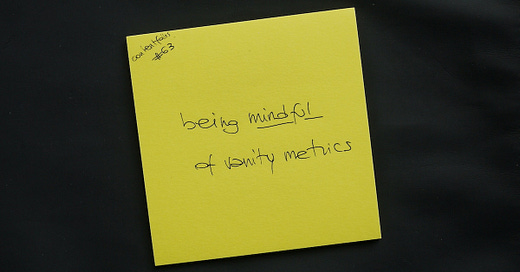You are reading contentfolks—a fortnightly blend of sticky notes, big content ideas, and small practical examples. Thank you for being here! ~fio
Hey there 👋
I’m back from a month-long break, during which I’ve been observing the pervasive discourse around AI and reading success stories from people who published a gazillion website pages in five seconds and (allegedly) got masses of organic traffic back.
Some of it seems genuinely interesting, but a lot looks like vanity metrics—so I thought I’d share a very personal story to make a somewhat professional point.
In the beginning there was… a really bad idea
Travel back in time with me to the summer of 2018, when I downloaded Headspace on my phone. The app helps you develop a habit of mindfulness and meditation, and comes with a streak feature that gives you badges if you keep it going: 1, 3, 10 days of meditation in a row, all the way up to 90, 180, and finally 365.
I wanted to build a long-term habit, so I thought the Headspace app looked promising and signed up for a year. I projected myself 365 days in the future, unlocking the 1-year streak badge…
…and that’s where everything started to go wrong.
Because, see: I chose the wrong metric to measure this activity by. I picked the vanity metric of how many days in a row I could keep it going instead of the yes/no metric of whether I was indeed becoming more mindful.
I thought ‘365 days in a row’ looked good and would make me look good, too.
Which is exactly the problem with a vanity metric.
The danger of vanity metrics
Vanity metrics emphasise scale and might inspire awe and envy—but they don’t reveal anything useful about the ongoing health of a system, and might even obscure its underlying problems.
For example:
The number of words in a blog post doesn’t speak to its value for a reader
The number of pieces published in any given week says nothing about their impact on the bottom line
The amount of organic traffic driven to a website is pointless if nobody takes action after getting there
Luckily, a system of spreadsheets, growth lines, and bank statements helps keep things in check for a business. If the $$$ numbers don’t go in the right direction, a vanity metric will eventually get spotted and (hopefully) rectified.
Humans, though? We don’t come with built-in Excel sheets, so checking in on the ongoing health of the system gets a little trickier.
Back in 2018, rather than being the enlightened human being I’d envisioned, I was becoming rrrrrrreally annoyed at my phone. The Headspace app would ping with a reminder, and I’d get an immediate surge of anger. I’d then keep snoozing said reminder, for hours in a row, until sometimes it got to 11.30 pm and I knew I just had to get. the. damn. thing. done not to lose the streak.
Clearly, the system was not healthy—but I had committed to a vanity metric, and my day count was still going up by 1 every day. By that measure, I was winning. So I kept it going.
It took me almost an entire year to figure out what was happening. And when I did, I ended up doing the only sensible thing you do when you recognise a vanity metric: I stopped tracking it.
After 323 days in a row, I broke my streak and quit Headspace, cold.
What a f—ing relief.
The moral of this story
Vanity metrics are easy to pick and hard to let go of. They can subtly but significantly damage the system for a long time before you spot them, at which point you’ll need to take a hard look at your actions and decide how to course correct. Fast.
This is true in both your personal and professional life. And since this is a newsletter about content marketing after all, if you take one thing away from my Headspace fiasco let it be this: find some time soon to think about the methods by which you/your team measure success, and see if you find anything there that needs changing.
Don’t wait a whole 323 days to figure it out 😉








It reminded me of my streak with Duolingo while learning Spanish. After 2-3 weeks, I was maintaining my streak just to pass the challenges.
Duolingo gamified it, and my 5-10 minutes weren't enough to keep up with the game for badges. I quit after 4 months. Realised that I wasn't learning much.